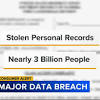Social Security
2024 - 8 - 14ALERT: Your Social Security Number May Have Just Been Hacked—Act Now!
Social Security Number Breach -- social security breach -- social security hack -- ssn leak Cost-of-Living Adjustment - Credit Freeze - Data Breach - Hackers - Identity Theft - Phishing - Social Security - Social Security Administration - Social Security Number Breach - social security breach - social security hack - ssn leakMajor data breach could mean your Social Security number is at risk! Learn how to protect yourself NOW before it’s too late! 😱💳 #DataBreach #IdentityTheft
In a shocking turn of events, hackers may have stolen the Social Security numbers of billions of people, putting millions at risk for identity theft and financial ruin. This alarming claim comes as part of a lawsuit filed by Christopher Hofmann, a California resident who alleges that his identity theft protection service first alerted him to the breach.
These cyber criminals are believed to have accessed private information from a background check company called National Public Data. They could potentially use this sensitive data to launch targeted phishing campaigns, or worse—take out loans and credit cards in your name. Experts are urging everyone to take immediate steps to protect their identities.
So what should you do if you think your Social Security number has been compromised? According to cybersecurity experts, freezing your credit is the number one piece of advice. This will prevent any new credit lines from being opened in your name, giving you a crucial layer of protection against financial fraud. Stay vigilant and regularly monitor your credit reports for any suspicious activity.
Interestingly, this breach could be one of the largest data theft incidents in recent history. To give you an idea of the scale, the alleged stolen records amount to 2.9 billion. While such an enormous figure might seem hard to believe, it underscores the growing sophistication of cybercriminal activities.
Did you know that older generations are more frequently targeted by Social Security scams? Often receiving distressing phone calls from scammers posing as government officials, asking for exorbitant sums to 'rectify' supposed errors. The Federal Trade Commission advises that no legitimate agency will request your Social Security number or payment over the phone.
Lastly, here's a fun fact: The first Social Security number was issued to a young man named John D. Sweeney in 1936. While he never anticipated the massive cybersecurity headaches of today, it serves as a startling reminder of how far-reaching these numbers have become in modern life.

Hackers may have stolen the Social Security numbers of every ... (ABC7 Los Angeles)
In malicious breaches, cybercriminals can use stolen data to target people with phishing messages, or by taking out loans or credit cards in their name, a ...

Hackers may have stolen the Social Security numbers of all ... (CBS News)
The allegation arose in a lawsuit filed earlier this month by Christopher Hofmann, a California resident who claims his identity theft protection service ...

Your Social Security number may have been stolen by hackers. How ... (Austin American-Statesman)
According to a lawsuit, USDoD claimed it had allegedly stolen personal records of 2.9 billion people in or around April 2024.

Hearing about leaked Social Security numbers? Don't panic. (The Washington Post)
Stolen data from a background check company may expose millions of Social Security numbers, a lawsuit claims. Here's how to protect yourself.

Steps to take to protect yourself from identity theft after massive ... (WPVI-TV)
A data breach involving billions of social security numbers has consumer advocates urgently sounding an alarm.

Social Security Numbers Reportedly Stolen in Hack: What to Know (The New York Times)
Hackers may have gained access to the private information of millions of people from a background check company called National Public Data.

2.9 billion people may have had Social Security numbers, other ... (CNBC)
Experts say freezing your credit is the "number one piece of advice" if you think your personal financial data has been compromised.

There's a New Type of Social Security Scam Emerging. It's ... (Money Talks News)
Older woman scared on the phone with a scammer. Frame Stock Footage / Shutterstock.com. A quick phone call from someone asking for $500,000 could raise red ...

Billions of social security numbers possibly stolen: What you can do ... (WPBF West Palm Beach)
Find out what the Social Security Administration says you should do if you think your social security number has been compromised.
AARP Idaho to host Social Security Telephone Town Hall (AARP States)
The program is secure today, but changes must be made to ensure future generations get the benefits they've earned.

Social Security recipients may see smallest cost-of-living adjustment ... (CBS News)
The shift may feel abrupt for the nation's nearly 68 million retirees, with recent years bringing bigger benefit bumps as a result of high inflation. Benefits ...

Annual Social Security adjustment expected to be much smaller this ... (KSBY San Luis Obispo News)
Millions of Americans will likely get a larger Social Security check in December, but it will probably not keep up with inflation, advocates say.

Hackers may have stolen the Social Security numbers of every ... (WTVD-TV)
In malicious breaches, cybercriminals can use stolen data to target people with phishing messages, or by taking out loans or credit cards in their name, a ...

If you're worried that your Social Security number was leaked, these ... (CNBC)
The service helps protect against financial fraud, identity theft, spam calls, online theft, phishing and scam websites, viruses and malware. While you can ...

Hackers may have stolen the Social Security numbers of every ... (KGO-TV)
In malicious breaches, cybercriminals can use stolen data to target people with phishing messages, or by taking out loans or credit cards in their name, a ...
Explore the last week
- 2024 - 12 - 20, 20 topics across 190 articles.
- 2024 - 12 - 19, 44 topics across 558 articles.
- 2024 - 12 - 18, 41 topics across 543 articles.
- 2024 - 12 - 17, 34 topics across 360 articles.
- 2024 - 12 - 16, 44 topics across 494 articles.
- 2024 - 12 - 15, 45 topics across 721 articles.
- 2024 - 12 - 14, 37 topics across 470 articles.